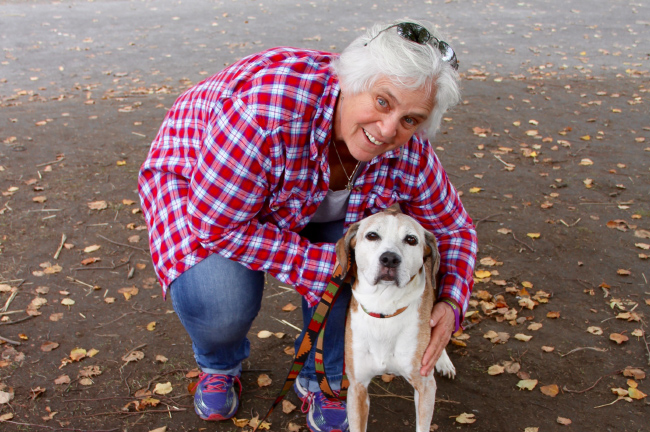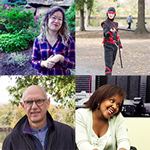Faces Behind the Screen: Sue
Quick Links
<< Return to all “Faces Behind the Screen” stories
At the Hearing Loss Association of America’s New England Walk4Hearing last fall, we had the opportunity to meet with a number of people in the deaf and hard of hearing community. Sue was one of the individuals we had the pleasure of meeting with and interviewing. She shared her story with us. Her story is one of positivity, self-identity, independence, and enlightenment!
Do you identify as deaf, hard of hearing, or something else?
Not deaf. Hard of hearing. I try to stay away from hearing impaired. It depends on the people. Sometimes I will tell people I am deaf – I am completely deaf without my hearing aid and my implant. Sometimes people just don’t get it, and it depends what I’m up against. It depends who I’m talking to and how obtuse they are.
“I am completely deaf without my hearing aid and my implant.”
Has technology over the years been a lot better for you and your hearing?
I started wearing a hearing aid in my left ear when I was seven. In high school I was told to wear two hearing aids, and I refused. At the time, they were bulkier. There were a lot of moisture problems, pressure problems. I was an athlete, and I just refused.
In college my hearing basically tanked. It plummeted on my left side. So of course, then I needed to hear, so the hearing aid went in my right ear. My left ear – they tried to put a hearing aid in it, but the drop was so severe that I understood nothing. It was like gobbledygook. It was just a lot of loud noise amplified in my ear. So I stopped wearing it.
“My left ear – they tried to put a hearing aid in it, but the drop was so severe that I understood nothing. It was like gobbledygook.”
Can you describe a moment where you felt discriminated against?
I was in a coffee shop, and I was meeting with a person for the first time who’s hard of hearing. We were just sitting there talking and this big guy came in with a clipboard. He’s coming to different tables and he’s asking people something. He comes to our table and mumbles something. I told him we have hearing loss and asked that he please repeat himself. He turned around and walked off. I figured it couldn’t have been too important.
Well, I was wrong, apparently. I went back out to the parking lot. My car was towed. I went back in and said that my car was out there a little while ago, and I asked what happened. She asked if I heard the guy make the announcement that cars would be towed if you weren’t in the restaurant. I said no, was it this guy with a clipboard? She said, yeah. I said, well, he came to the table and we told him we had hearing loss. Then he walked away. She told me I needed to call the management company.
“But when I called the management company, he said, I really find it hard to believe that you have hearing loss because you’re hearing me on the phone.”
But when I called the management company, he said, I really find it hard to believe that you have hearing loss because you’re hearing me on the phone.
What do you wish people could know about your experience?
That it differs in every situation and it’s not one model fits all. That’s the most frustrating part – because people really don’t know anything about hearing loss. That’s why I often tell people I am deaf without my hearing aids because they don’t get it otherwise.
“Hard of hearing, they think you can talk a little louder. Talking a little louder isn’t going to necessarily help.”
Hard of hearing, they think you can talk a little louder. Talking a little louder isn’t going to necessarily help. And you hear differently in different situations. So it could be I’m doing fine now, but if we get close to the [band playing in this park], I don’t do as well.
Just be patient and take your cues from me rather than you tell me what I need to do. You need to just speak clearly and slowly and face me. And if I say “What?” then answer me.
How do you feel technology helps or hurts you or your ability to communicate?
If I didn’t have a hearing aid or a cochlear implant, I would just be dependent on speech reading and lip reading and cues in my environment. I wouldn’t be up in the morning if I didn’t have a bed shaker under my bed that’s attached to my alarm clock, my cell phone, and the house phone.
I use what’s called a Roger Pen, in meetings, to amplify voices coming from a distance. Since the implant I do better in restaurants and can filter out background noises. It depends on the certain situation.
Are closed captions something that you rely on?
I use it on television. I use it for movies, and if I can find it on YouTube (even though the captioning on YouTube is poor at best).
Even at work, I will [use captions]. If I know we’re going to have a video, I will ask if it’s captioned. Usually I don’t find out about it early enough for them to be able to find out if it’s captioned. Or oftentimes it is captioned, and I can see it’s a YouTube video (or I can see the CC button) but I can’t get to the speaker to just say, “Can you push the button?”
“It’s a challenge – and I kind of amaze myself because I understand more than I don’t understand. But it’s exhausting.”
Is there a common sense of disappointment every time you encounter YouTube captions?
It is. It’s a challenge – and I kind of amaze myself because I understand more than I don’t understand. But it’s exhausting. So at the end of that meeting or whatever it is, I’m like “ugh!”
Can you give one piece of advice?
Don’t take your hearing for granted. Hearing health doesn’t hit you until it hits you. And at that point, it’s almost too late to do anything about it. And it’s a long way back.
A huge ‘thank you’ to the Hearing Loss Association of America (HLAA) for hosting this series of interviews at the New England Walk4Hearing in Fall of 2016. Click on the image below to read more stories on the main site.
Faces Behind the Screen is a storytelling project focusing on members of the Deaf and hard of hearing community.





